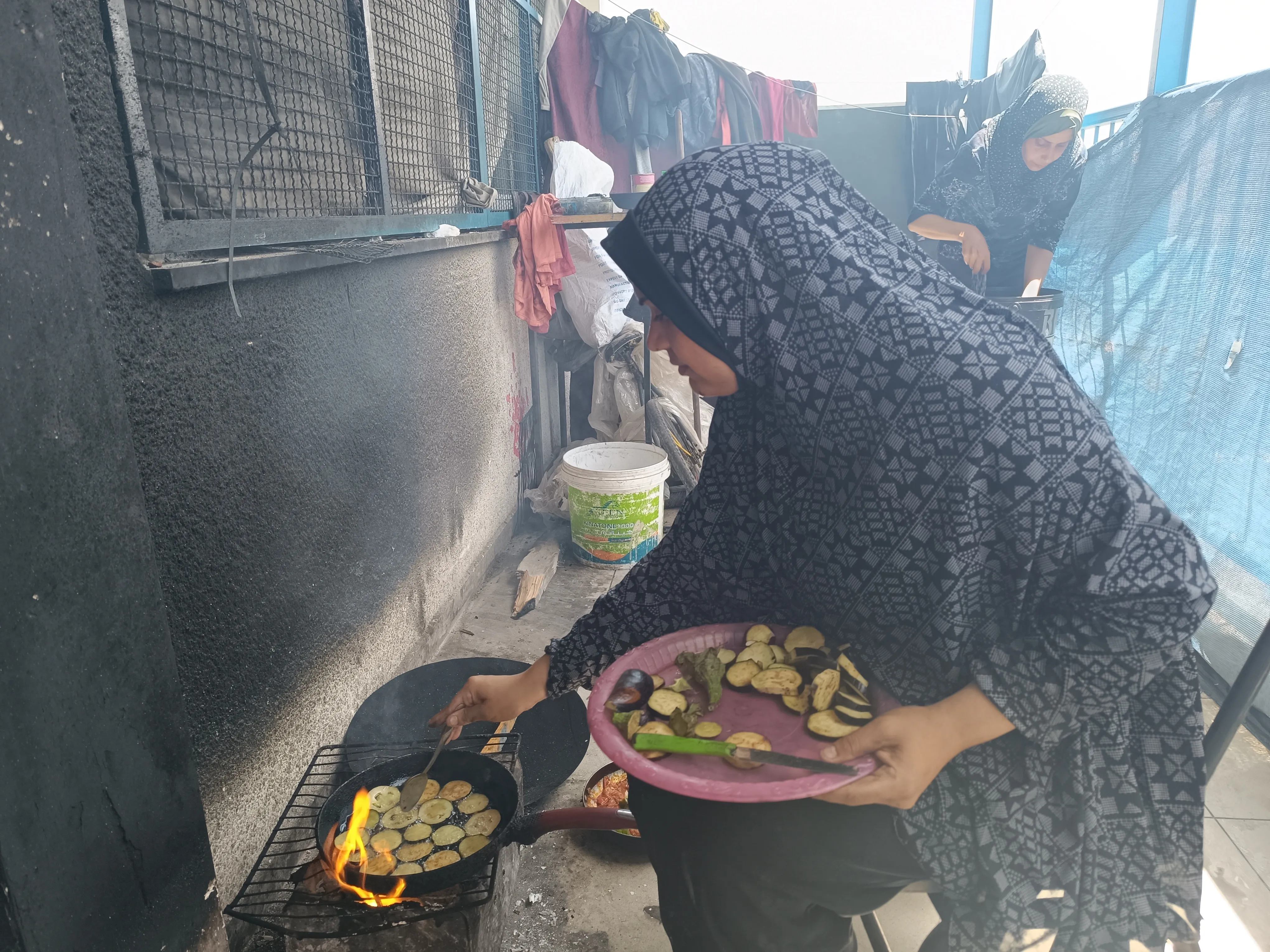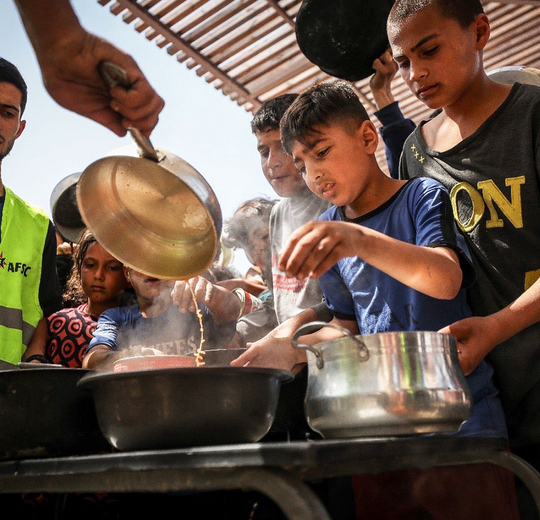My name is Manar Wadi, I am 30 years old. I am from the Jabalia refugee camp in northern Gaza. I was under siege in Al-Nasser Hospital in Khan Younis for a month long. During that time, I saw death at every moment, and fled under from heavy shelling. I don't know how I am still alive.

"My daughter, Ayat, suffered from seizures due to the continuous and intense Israeli shelling. Additionally, during the war, my infant son, Amir, experienced involuntary urination due to extreme fear. He also suffered from seizures after inhaling the Israeli tear gas. I am very afraid for my children, and there is no treatment available in Gaza."
After the first week of the Israeli war on Gaza, I evacuated from my home in Jabalia refugee camp in the northern Gaza Strip. I suffered from the journey of displacement. I traveled from Nuseirat camp to Khan Younis city, then to Rafah city, then to Deir al-Balah city, and finally, I returned to Nuseirat camp. The hardest period of my displacement was during the occupation’s raid on Nasser Hospital in Khan Younis, which forced us into a nearby building for a month. I saw death at every moment and then fled from the heavy shelling. I don’t know how I am still alive.
My name is Manar Wadi, and I am 30 years old and married to Mahmoud Wadi. I have three children: Ahmed, ten years old, Ayat, six years old, and Amir, one-and-a-half years old. We live in Jabalia refugee camp in the northern Gaza Strip. After my marriage, I completed my university studies at Al-Quds Open University. I graduated in 2017 with a bachelor’s degree in mathematics. I got a temporary job as a ninth-grade math teacher at Hamama School in the northern Gaza Strip. My goal was to help my husband and get a permanent job, but then the war came, destroying all our dreams.
After the Israeli shelling intensified in the northern Gaza Strip, my husband, my children, and I fled to Nuseirat camp in the centre of the Strip. I lived in my cousin’s house for a week, and after heavy shelling in Nuseirat camp, my family and I headed to Khan Younis city in south Gaza.
We set up a tent in a vocational training centre belonging to the Palestinian government, adjacent to Nasser Hospital in western Khan Younis. I felt the place was safe because it was near a hospital and because thousands of displaced people were living there. I bought wood, a tent, and blankets. I prepared my tent properly so that my family and I could live comfortably during the winter.
I bought 16 blankets, each costing 35 Israeli shekels. I thought I would live in the tent for a week or a month, but I lived in it for three months. This led me to buy large amounts of wood to reinforce the tent to withstand the rain. I also bought a gas cylinder for 500 shekels and a gas cooker for 500 shekels, as well as dishes and kitchen utensils at prices ten times higher than before the war. My only concern was to provide everything necessary for my children.
After the end of the humanitarian cease-fire in November 2023, the Israeli forces stormed Khan Younis. My family and I thought the occupation wouldn’t reach Nasser Hospital, where we were living as displaced people, as Khan Younis is a large city. We believed they would stay in the eastern areas of the city, so we decided to stay in our tent adjacent to the hospital, considering hospitals are protected under international humanitarian law.
A few days after the occupation stormed Khan Younis, we were surprised by the sounds of Israeli tanks. My husband tried to find the source of the noise, but Israeli drones fired at anyone who moved. I asked my husband not to go out, and we stayed in the tent encampment with thousands of other displaced people until the occupation forces approached us just a few meters away.
Israeli snipers occupied tall buildings around Nasser Hospital and prevented all displaced people from moving or leaving the tents. Israeli shelling continued fiercely around us until the occupation forces bombed the shelter centre where we were living, resulting in the deaths of 13 people. The shelling caused a large fire at the site, which lasted from 12 noon until ten pm. My family managed to extinguish the fire with great difficulty.
We contacted the Red Cross to evacuate us. They instructed us to stay away from the centre’s gates and to remain inside the tents. The occupation forces threw tear gas grenades behind the centre. My youngest son, Amir, who is a one-and-a-half years old, was affected by the gas and lost consciousness for more than ten hours. I carried him and ran through the shelling to Nasser Hospital, where he stayed for four days receiving treatment. Then, I returned to the shelter centre with my husband and children.
The occupation forces called the centre’s official, Rawiya Hilles, and asked her to tell everyone in the centre. They warned us to evacuate the place by 5 a.m., but there was no transportation available to take us to Rafah city. After extreme difficulty, my husband found a car, and we paid 600 shekels and a 50-kilogram [110-pound] bag of rice for the driver to take us to Rafah.
The car only had room for two people, so my husband and I sat with our children in our laps. We left everything we owned in the tent. We could only take one tent, two mattresses, and some clothes for my children. We left behind all the food, drinks, clothes, and tools that I had bought in the school. My only thought was to save myself and my children from death.
Before successfully escaping the Israeli shelling, we tried many times to leave the centre, raising white flags, but the Israeli snipers fired at us, and the occupation vehicles prevented us from leaving. We lived through the most difficult days of our lives, full of fear and death. We buried 13 displaced people, most of them children and women, who were killed by the Israeli shelling at the centre. We buried them inside the centre. By the grace of God, we survived, and we managed to reach Rafah after a month of the deadly Israeli siege.
My daughter, Ayat, suffered from seizures due to the continuous and intense Israeli shelling. Additionally, during the war, my infant son, Amir, experienced involuntary urination due to extreme fear. He also suffered from seizures after inhaling the Israeli tear gas. I am very afraid for my children, and there is no treatment available in Gaza.
After arriving in Rafah, we set up a tent in a displacement camp. The camp was frightening, filled with snake holes and harmful animals. We lived there for ten days, then we moved again to Deir al-Balah in the middle of the Gaza Strip. We lived there for three days in a tent next to my sister’s house at the martyr Mohammed al-Dura stadium, then I returned to the Nuseirat camp. This time, I returned to a school-turned-shelter belonging to UNRWA in the middle of the camp.
I currently live with 12 other families in a small classroom. We’ve gotten to know each other during the war. I have now been living in the school for two months. The school was bombed by the Israelis twice, and dozens of displaced people were killed or injured. I try to keep my children with me all the time. I fear for them with the shelling that even international shelter centres are not safe from.
We suffer from poor distribution of food aid at the school. We only receive a box of canned goods every ten days. Sanitation and health conditions are very poor. The bathrooms are few and public, used by thousands. Water is scarce and causes many diseases. My children don’t have enough clothes, and we don’t have any money. All the money I had before the war has been spent. We are living in extremely catastrophic conditions.
My son needs prescription glasses, and we don’t have money. There are no eye centres operating during the war. All I dream of now is for this war to end immediately, and for us to return to our home in Jabalia camp. I don’t want to be displaced anywhere else. However, the shelling on the Nuseirat camp continues. The occupation forces stormed the camp less than a month ago, destroying dozens of houses and causing us extreme fear.
My dream before the war was to get a stable and permanent job to help my husband with household expenses. But now, we don’t know anything about our home. We didn’t know whether it was destroyed or if it is still standing. I suffer from shortness of breath at the age of 30 due to inhaling smoke when cooking food over a fire. I hope to reunite with my husband and children in our home soon, and for Gaza to return to being a safe and beautiful place as it was before the war. We love life in peace and security, and we want Gaza to be safe forever. The war must stop immediately, and life must return to Gaza.
Take action now
Tell Congress to demand lifesaving aid for Gaza
The humanitarian crisis in Gaza has reached catastrophic levels. Since March 2, 2025, Israel—with full support from the U.S.—has severely restricted food, water, medicine, and humanitarian aid from entering Gaza.
Contact
If you have questions or concerns, please contact us at gazaunlocked@afsc.org.

